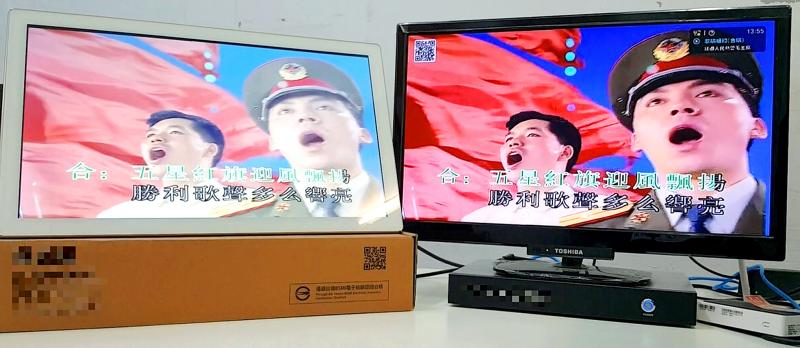A legislator yesterday called for authorities to investigate the sale of Chinese-made, Internet-connected karaoke machines containing “propaganda songs.”
Democratic Progressive Party Legislator Chen Ting-fei (陳亭妃) said she was approached by a person who had discovered Chinese patriotic songs such as My Motherland (我的祖國) — which is commonly referred to as China’s “second national anthem” — in Chinese-made karaoke devices sold in Taiwan.
The machines are popular, as they can connect to the Internet, providing access to thousands of songs, she said.

Photo courtesy of Democratic Progressive Party Legislator Chen Ting-fei
One retailer, who asked to remain anonymous, said that the machines first entered the local market about three years ago, starting with karaoke booths installed at public venues.
There are seven brands of the Chinese-made devices sold in Taiwan, including home and commercial units, the retailer said.
While local companies selling karaoke machines in Taiwan must obtain copyright permission for songs — up to 20,000 on home units and 30,000 in commercial devices — the Chinese machines circumvent these rules, they said.
“The Chinese Internet-connected devices break Taiwan’s copyright laws, which is why they can claim to have more than 700,000 songs on them, and why companies selling or publicly using them often face lawsuits,” they said.
‘UNITED FRONT’
These devices invariably contain many songs that are sung by China’s military, or by other members of the Chinese Communist Party, they said, adding that music videos accompanying the songs show Chinese soldiers and weapons.
“Most of these devices come equipped with off-the-shelf boxes that connect to servers in China, which is where they get their content,” Chen said.
China uses pro-unification songs on the karaoke machines as part of its “united front” tactics, and Beijing could stream anything it wants to the devices, she said, adding that she had scheduled a meeting with members of the National Communications Commission and the Ministry of Economic Affairs to discuss the matter at the end of the month.
The Mainland Affairs Council also expressed concern over the content on the Chinese-made karaoke machines, saying that they breached the rights of Taiwanese artists, whose work is often used on the devices without their permission.
The council said it had already filed a lawsuit against Taiwanese companies selling the devices in August last year, and had also met with the commission and the ministry to discuss the issue.

‘DENIAL DEFENSE’: The US would increase its military presence with uncrewed ships, and submarines, while boosting defense in the Indo-Pacific, a Pete Hegseth memo said The US is reorienting its military strategy to focus primarily on deterring a potential Chinese invasion of Taiwan, a memo signed by US Secretary of Defense Pete Hegseth showed. The memo also called on Taiwan to increase its defense spending. The document, known as the “Interim National Defense Strategic Guidance,” was distributed this month and detailed the national defense plans of US President Donald Trump’s administration, an article in the Washington Post said on Saturday. It outlines how the US can prepare for a potential war with China and defend itself from threats in the “near abroad,” including Greenland and the Panama

A wild live dugong was found in Taiwan for the first time in 88 years, after it was accidentally caught by a fisher’s net on Tuesday in Yilan County’s Fenniaolin (粉鳥林). This is the first sighting of the species in Taiwan since 1937, having already been considered “extinct” in the country and considered as “vulnerable” by the International Union for Conservation of Nature. A fisher surnamed Chen (陳) went to Fenniaolin to collect the fish in his netting, but instead caught a 3m long, 500kg dugong. The fisher released the animal back into the wild, not realizing it was an endangered species at

The Chinese Nationalist Party (KMT) is maintaining close ties with Beijing, the Democratic Progressive Party (DPP) said yesterday, hours after a new round of Chinese military drills in the Taiwan Strait began. Political parties in a democracy have a responsibility to be loyal to the nation and defend its sovereignty, DPP spokesman Justin Wu (吳崢) told a news conference in Taipei. His comments came hours after Beijing announced via Chinese state media that the Chinese People’s Liberation Army’s Eastern Theater Command was holding large-scale drills simulating a multi-pronged attack on Taiwan. Contrary to the KMT’s claims that it is staunchly anti-communist, KMT Deputy

The High Prosecutors’ Office yesterday withdrew an appeal against the acquittal of a former bank manager 22 years after his death, marking Taiwan’s first instance of prosecutors rendering posthumous justice to a wrongfully convicted defendant. Chu Ching-en (諸慶恩) — formerly a manager at the Taipei branch of BNP Paribas — was in 1999 accused by Weng Mao-chung (翁茂鍾), then-president of Chia Her Industrial Co, of forging a request for a fixed deposit of US$10 million by I-Hwa Industrial Co, a subsidiary of Chia Her, which was used as collateral. Chu was ruled not guilty in the first trial, but was found guilty